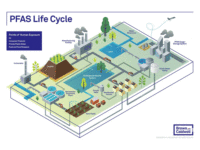The Water Research Foundation (WRF) has granted $100,000 to Brown and Caldwell for the project, Developing a Framework for Quantifying Energy Optimization Reporting (5091). The framework developed through this project will help water and wastewater utilities make informed capital expenditure decisions and increase confidence in future energy efficiency and emission reduction projects.
Energy projects are often discretionary and initiated based on projected annual energy savings metrics. The water industry lacks standard energy savings estimation methods, as well as measurement and verification (M&V) approaches and procedures to quantify results. This inconsistency in variables and data collection can lead to inaccurate estimations and a lack of confidence in optimistic savings and capital cost forecasts for energy projects across the One Water cycle.
Partly funded by WRF via its Research Priority Program, the 24-month research project will develop a framework and methodology to scrutinize current pre-project energy savings estimation procedures and decision-making practices. Led by Brown and Caldwell, the project team includes 25 water and electrical utilities with established M&V knowledge to ensure reporting is data-driven, efficient, and grounded in utility experience. Around 35-40 completed energy projects will be analyzed to compare actual economic performance to the values forecast before project commencement. Several academia and industry associations are also on the project team.
“We use energy management to not only contain expenses in our wastewater operations, it’s one of our strategies for sustainability. We aim to minimize our environmental impact and plan for affordable treatment services in the long term for the Twin Cities region,” said David Ponder, environmental analyst, Metropolitan Council Environmental Services. “We’re sharing some of our energy projects as case studies in this research effort. Having industry standards for energy savings estimates will help us build the business case for energy efficiency investments and make it easier to position our projects with our electric utility partners to obtain incentives.”
Upon completion, the project results will increase confidence in the economic feasibility and energy reduction impact analyses used by water and wastewater utilities to determine energy project viability. The research will lay a foundation for future economic feasibility evaluations and post-construction measurement and verification of energy performance.
Project deliverables include a report detailing the framework for new/planned projects and a standardized reporting template to assess projects against key performance indicators. The report will consist of analyses of the completed projects with before and after data comparisons and a results summary of the energy efficiency upgrades. A webcast describing the project's findings will be included.
The recently commenced study is scheduled for completion by spring 2023.


